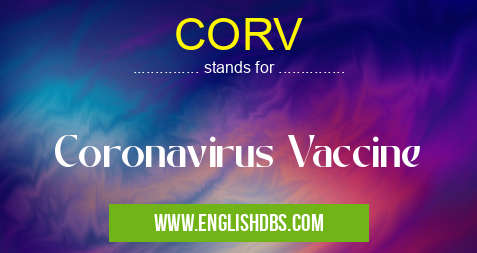What does CORV mean in VACCINE
CORV stands for Coronavirus Vaccine. It refers to a group of vaccines developed to provide immunity against the coronavirus, particularly the severe acute respiratory syndrome coronavirus 2 (SARS-CoV-2), which causes COVID-19. The goal of CORV is to protect individuals from developing severe disease, hospitalization, and death due to COVID-19.

CORV meaning in Vaccine in Medical
CORV mostly used in an acronym Vaccine in Category Medical that means Coronavirus Vaccine
Shorthand: CORV,
Full Form: Coronavirus Vaccine
For more information of "Coronavirus Vaccine", see the section below.
CORV: Types and Development
CORVs are categorized into different types based on their mechanism of action. Some common types include:
- mRNA vaccines: Use messenger RNA (mRNA) to encode the viral spike protein, which induces an immune response in the body.
- Vector vaccines: Utilize a harmless virus or bacteria to deliver genetic material that codes for the viral spike protein.
- Inactivated vaccines: Contain inactivated forms of the virus, stimulating the immune system to produce antibodies against the virus.
The development of CORVs involved extensive research and clinical trials to ensure their safety and efficacy. Researchers worked to identify the most effective viral targets, optimize vaccine formulations, and conduct rigorous testing to evaluate their immune response and protection against COVID-19.
Importance of CORV
CORVs play a crucial role in the global fight against COVID-19. They have significantly reduced the number of severe cases, hospitalizations, and deaths caused by the virus. CORVs have also helped to slow down the spread of the virus, protect vulnerable populations, and contribute to the lifting of restrictions that impacted daily life.
Essential Questions and Answers on Coronavirus Vaccine in "MEDICAL»VACCINE"
What is the Coronavirus Vaccine (CORV)?
The Coronavirus Vaccine (CORV) is a vaccine designed to provide immunity to the SARS-CoV-2 virus, which causes COVID-19. CORV is a type of mRNA vaccine, which means it contains genetic material that instructs cells to produce the spike protein found on the virus. This allows the immune system to recognize and fight off the virus if encountered in the future.
Who should get vaccinated with CORV?
The CDC recommends that everyone aged 5 years and older get vaccinated with CORV. The vaccine is particularly important for people who are at high risk of developing severe COVID-19, such as those with underlying health conditions or those who are over the age of 65.
How effective is CORV?
CORV is highly effective in preventing severe COVID-19, hospitalization, and death. Studies have shown that CORV is 95% effective in preventing symptomatic COVID-19 and 98% effective in preventing hospitalization and death.
Are there any side effects associated with CORV?
CORV is generally well-tolerated, but some side effects can occur. The most common side effects include pain at the injection site, fever, chills, muscle aches, and headache. These side effects are usually mild and resolve within a few days.
How long does CORV protection last?
The duration of CORV protection is still being studied. However, current data suggests that protection lasts for at least several months. It is possible that booster shots will be needed in the future to maintain immunity.
Can CORV cause COVID-19?
No, CORV cannot cause COVID-19. CORV contains genetic material only from the spike protein, not the whole virus. This means that it cannot replicate and cause infection.
Is it safe to get CORV if I have had COVID-19?
Yes, it is safe to get CORV even if you have had COVID-19. In fact, getting vaccinated can help boost your immunity to the virus.
Final Words: CORV stands for Coronavirus Vaccine. It represents a range of vaccines developed to provide immunity against the coronavirus and prevent COVID-19. The development of CORVs involved extensive research and clinical trials to ensure their safety and efficacy. CORVs have proven to be instrumental in reducing the impact of the COVID-19 pandemic by preventing severe disease, protecting vulnerable populations, and contributing to the resumption of normal activities.
